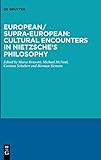European/Supra-European: Cultural Encounters in Nietzsche’s Philosophy / ed. by Marco Brusotti, Michael McNeal, Corinna Schubert, Herman Siemens.
Material type: TextPublisher: Berlin ; Boston : De Gruyter, [2020]Copyright date: ©2020Description: 1 online resource (XXXII, 384 p.)Content type:
TextPublisher: Berlin ; Boston : De Gruyter, [2020]Copyright date: ©2020Description: 1 online resource (XXXII, 384 p.)Content type: - 9783110605044
- 9783110605235
- 9783110606478
- B3317 .E97 2020
- online - DeGruyter
| Item type | Current library | Call number | URL | Status | Notes | Barcode | |
|---|---|---|---|---|---|---|---|
 eBook
eBook
|
Biblioteca "Angelicum" Pont. Univ. S.Tommaso d'Aquino Nuvola online | online - DeGruyter (Browse shelf(Opens below)) | Online access | Not for loan (Accesso limitato) | Accesso per gli utenti autorizzati / Access for authorized users | (dgr)9783110606478 |
Frontmatter -- Table of Contents -- Notes on Contributors -- Abbreviations and References -- European/Supra-European: Cultural Encounters in Nietzsche’s Philosophy -- Part I. European Views -- Times of the Multitude and the Antichrist -- Goethe, Nietzsche, Varoufakis: Why Did the Greeks Matter – and Still Do? -- Nietzsche, Liberalism, and the Future of European Democracy -- How Does One Become Greek? Nietzsche and the Rediscovery of the South -- Europa nach Nietzsche: Integration ohne Identität -- Nietzsche’s Europe -- Thus Spoke Zarathustra and a Europe Yet to Come -- “What Renders Our Sores Repugnant”: Reconsidering Nietzsche on Ressentiment -- Two Visions of Europe: Nietzsche and Guizot -- Nietzsches Europa. Überlegungen zu einer neuen geistigen Landschaft -- Die „freie Gesellschaft“ als ‚hölzernes Eisen‘: Gesellschaftliche Perspektiven Europas im Abschnitt 356 von Nietzsches Fröhlicher Wissenschaft -- Transgressions of the Lawgiver: Nietzsche, Culture and the ‘Good European’ -- Beyond Boundaries: Contesting Authorities in Nietzsche’s Europe -- Good Europeanism: The Practice and Pathos of Nietzsche’s Good Europeans -- Part II. Beyond Europe: Nietzsche’s View from Afar -- Nietzsches ‚übereuropäisches‘ Denken – biographische und kulturelle Aspekte -- Nietzsches Interkulturalität und die anthropologische Perspektive der Klassischen deutschen Philosophie -- Im ‚Zeitalter der Vergleichung‘: Nietzsche, das Problem der Wertschätzungen und das Erbe Feuerbachs -- Europäisch, übereuropäisch – menschlich? Über Grenzüberschreitungen in Nietzsches Humanitätsverständnis -- Nicht-Europäisch oder Über-Europäisch? Zur alten Frage, was Russland ‚versprechen kann‘ -- „Unter Töchtern der Wüste“. Islamische Sinnlichkeit und christliche Sexualfeindlichkeit bei Nietzsche -- Nietzsche and the Falāsifa -- Wer ist der „gute Europäer“? – Aus der Perspektive der japanischen Nietzsche-Forschungsgeschichte -- The Children of Nietzsche: Chaos, Plurality and Cosmopolitanism in Joyce and Pessoa -- Index of Subjects -- Index of Names
restricted access online access with authorization star
http://purl.org/coar/access_right/c_16ec
Nietzsche says "good Europeans" must not only cultivate a "supra-national" view, but also "supra-European" perspective to transcend their European biases and see beyond the horizon of Western culture. The volume takes up such conceptual frontier crossings and syntheses. Emphasizing Nietzsche's genealogy of European culture and his reflections upon the constitution of Europe in the broadest sense, its essays examine peoples and nations, values and arts, knowledge and religion. Nietzsche's apprehensions about the crises of nihilism and decadence and their implications for Europe's (and humankind’s) future are investigated in this context. Concerning the crossing of notional frontiers, contributors examine Nietzsche’s hoped-for dismantling of Europe’s state borders, the overcoming of national prejudices and rivalries, and the propagation of a revitalizing "supra-European" perspective on the continent, its culture(s) and future. They also illuminate lines of syntheses, notably the syncretism of the ancient Greeks and its possible example for the European culture to-be. Finally certain of Europe's current problems are considered via the critical apparatus furnished by Nietzsche's philosophy and the diagnostic tools it provides.
Mode of access: Internet via World Wide Web.
In English.
Description based on online resource; title from PDF title page (publisher's Web site, viewed 26. Mai 2021)


